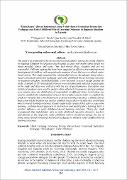| dc.contributor.author | Sarah, Mugerwa N. | |
| dc.contributor.author | Godfrey, Ejuu | |
| dc.contributor.author | Peter, Wanderi M. | |
| dc.date.accessioned | 2023-05-26T07:15:53Z | |
| dc.date.available | 2023-05-26T07:15:53Z | |
| dc.date.issued | 2023-04 | |
| dc.identifier.citation | Mugerwa, S. N., Ejuu, G., & Wanderi, P. M. (2023). “Ekisaakaate”(Royal Enclosure) Living Values-Based Contextual Instruction Pedagogy and Early Childhood Moral Learning Outcomes in Buganda Kingdom in Uganda. African Journal of Education, Science and Technology, 7(3), 561-570. | en_US |
| dc.identifier.uri | https://hdl.handle.net/20.500.12504/1355 | |
| dc.description.abstract | The study was prompted by the increasing moral decadence among the young children
in Buganda Kingdom in particular and Uganda at large with many young people not
being merciful, honest and loyal. They lack moral ethics, etiquette and are not
responsible. Different approaches have been suggested as effective in promoting moral
development of children, with no particular mention of one that uses a cultural value-
based system. This study examined the relationship between ekisaakaate living values-
based contextual instruction pedagogy and early childhood moral learning outcomes
in Buganda Kingdom. Methodologically, cross-sectional research design guided the
study. A sample of 159 ekisaakaate trainers were systematically selected to participate
in the study and data were collected with the use of questionnaires. Descriptive and
statistical analyses were used to analyze data collected. Frequencies and percentages
were used to show the distribution of respondents on different items. Correlation was
used to establish the relationships between the variables and in order to establish the
predictor variable that contributed most to moral learning outcomes, a Simple Linear
Regression (SLR) Analysis was used to establish the predictor variable that contributed
most to moral learning outcomes. Results empirically revealed that active cooperative
learning, problem-based approach to instruction and participatory learning have a
positive influence on early childhood moral learning outcomes. Hence the study
recommends that stakeholders such as early childhood education directors, teachers
and parents in the respective early childhood centers should encourage the use of
living values-based contextual instruction pedagogy to enhance early childhood moral
learning outcomes. | en_US |
| dc.language.iso | en | en_US |
| dc.publisher | African Journal of Education, Science and Technology | en_US |
| dc.subject | Moral Learning Outcomes | en_US |
| dc.subject | Living Values-Based Contextual Instruction Pedagogy | en_US |
| dc.subject | “Ekisaakaate” | en_US |
| dc.subject | Early Childhood | en_US |
| dc.title | “Ekisaakaate” (royal enclosure) living values-based contextual instruction pedagogy and early childhood moral learning outcomes in Buganda kingdom in Uganda | en_US |
| dc.type | Article | en_US |

